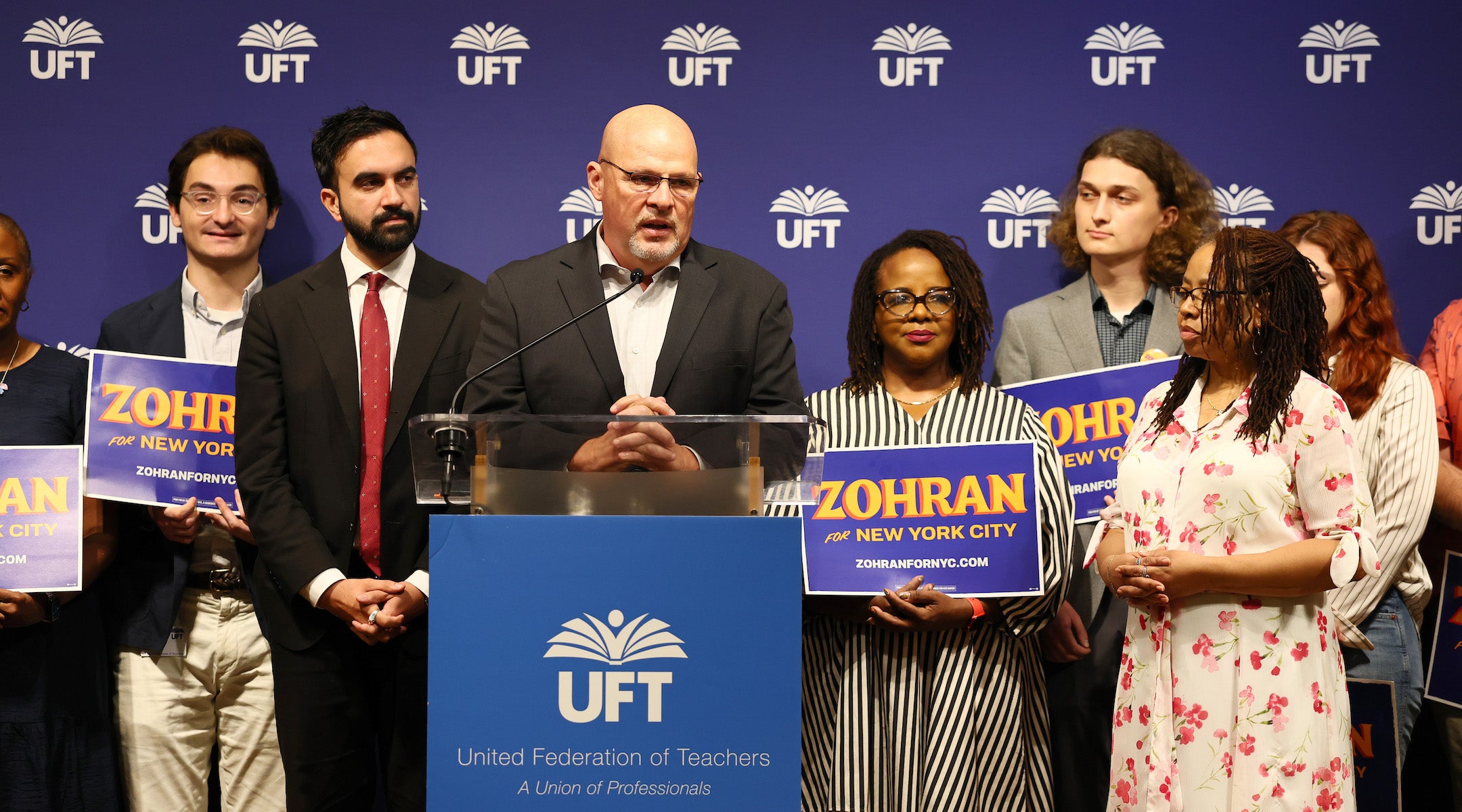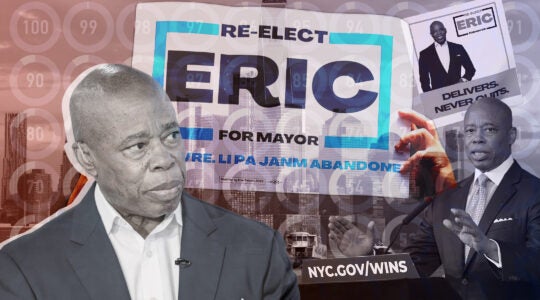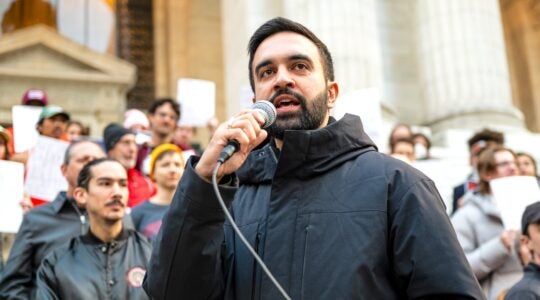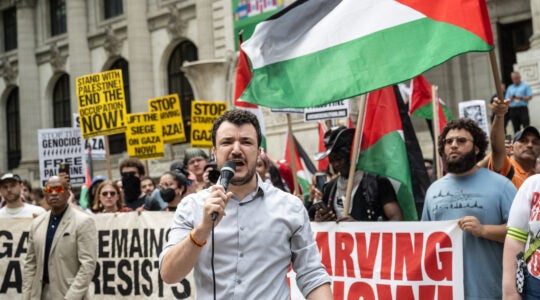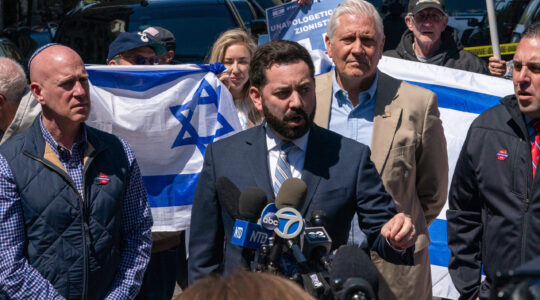Moshe Spern thought Michael Mulgrew would listen to him.
The 14-year UFT member lobbied hard for the incumbent president of the United Federation of Teachers, New York City’s teachers union, to be reelected back in May, writing in an open letter that he believed Mulgrew “understands the pressing concerns facing Jewish educators in 2025.”
Mulgrew ultimately eked out a win in the union’s closest-ever election, fending off two progressive challengers who had previously expressed public criticism of Israel.
So when the union faced a decision about whom to endorse in the New York City mayoral election, Spern was optimistic that Mulgrew might take heed of his exhortation not to back anyone at all. He was particularly concerned about Zohran Mamdani, the frontrunner who has received criticism from Jewish groups and leaders for his record of criticizing Israel and supporting the Boycott, Divestment and Sanctions movement.
“I would never, ever, ever call Mamdani an antisemite,” said Spern, saying that was a determination he would not make “until I actually have a conversation with a person or I see something. But Mamdani is an open anti-Zionist, and that’s not debatable.”
Last month, the UFT made its decision: It’s backing Mamdani for mayor.
For Spern, who leads a 250-member advocacy group called United Jewish Teachers, the endorsement came as a blow.
“We helped elect Mulgrew, and now we feel like Mulgrew sort of stabbed us in the back,” said Spern, who works as a special education and history teacher at a Queens high school before pulling a second shift as a yeshiva administrator in the afternoon.
He is not the only UFT member to feel that way. Across the 200,000-member union, which was once dominated by Jewish teachers and had Jewish presidents from its founding in 1960 until Mulgrew’s election in 2009, some Jewish educators are grappling with feelings of betrayal and fear after their union backed a candidate that they believe is dangerous for them.
“The concern isn’t just political,” said Karen Feldman, a former New York public school teacher and co-founder of NYCPS Alliance, a Jewish educator advocacy group with over 2,500 participants. “It’s about safety for Jewish educators, the growing politicization of our classrooms, and the erosion of trust in a union that should protect teachers — not push a radical agenda. We truly were hoping that our union would not endorse anyone this election because it is such a divisive and heated one.”
At the same time, some Jewish teachers are cheering their union’s endorsement, saying they believe Mamdani is the best candidate in the race — and in some cases backing his stances on Israel, too.
The UFT did not endorse in the primary after initially pledging to, saying that members were too divided to reach a consensus, including over issues related to Israel and the war in Gaza.
But that it is backing Mamdani in the general election is not fully surprising: He’s the Democratic candidate, and he also says he wants to roll back aspects of mayoral control, which the union reviles, and give more power to educators in the city. He’s a graduate of a public high school in the city. And his campaign has centered on the kinds of pocketbook issues that affect municipal workers including teachers.
“We have to make New York City safer and more affordable for working- and middle-class families. We have to make the jobs of educators and nurses more attractive with better pay and benefits, and retain those already doing the work. We need a mayor who understands the task before us and who will help us get it done,” Mulgrew said in a statement after the union’s decision-making body announced its endorsement. “The UFT Delegate Assembly has determined that Zohran Mamdani can be that partner as the next mayor of New York City.”
Still, there are precedents for the union to stay out of mayoral elections. The union did not endorse anyone in 2005 or 2009, when Michael Bloomberg ran for reelection, and also sat out two general elections in the 1990s, according to the education news outlet Chalkbeat.
Some UFT members are lashing out at the union, sharing information about how to opt out of payments to its political arm, known as the Committee on Political Education or COPE. Others are considering stopping paying dues entirely, an option that has been available to them only since a 2018 Supreme Court ruling that barred mandatory enrollment in public sector unions.
On social media, some teachers have taken to reposting a UFT website instructing teachers on how to opt out of COPE payments. Spern — who himself has endorsed Mayor Eric Adams in the election — said he believed that “hundreds” of educators had stopped their COPE payments and said he knew of close to 100 who planned to stop paying dues.
He believes the number will rise. Last month, he hosted a webinar with Feldman for more than 100 attendees explaining how teachers can pull their dues. And last week, he published an article in 5 Towns Central, serving a heavily Jewish region of Long Island that is home to many union members, announcing that UFT members were organizing a movement to pull dues over the Mamdani endorsement.

Moshe Spern and Karen Feldman appear in a webinar on July 18 with 100 attendees explaining how teachers can pull their dues. (Screenshot)
“Many educators have come out of concern about whether they should continue their dues, seeing how the union has sort of left them behind,” Spern said in an interview. “And I think that’s a very, very real, raw emotional state of Jewish teachers, where they question whether they’re paying their dues to the right organization.”
Among those to have sent a letter expressing intent to withhold dues for the coming school year is a Modern Orthodox occupational therapist who has worked in the city’s schools for nine years and has a son in the Israeli army.
“It not only shows that they’re maybe dumb and corrupt, but it shows they have absolutely no regard for people like me, they have no regard for my needs,” the educator, who asked for anonymity to avoid jeopardizing her employment, said in an interview about her union. “You’re picking someone who hates me and has threatened my people and my homeland.”
But other Jewish educators in the city say they have no qualms about continuing to support the union, at least when it comes to its mayoral endorsement.
Melissa Turoff, who teaches at Bard High School Early College in Manhattan, said she was “happy” to learn of the union’s endorsement of Mamdani.
“I think that unions should back candidates that have a really progressive vision for New York, like Mamdami,” she said.
Turoff, whose grandmother was Israeli, has studied the history of imperialism in Israel and the Middle East; attended meetings of Jewish Voice for Peace, an anti-Zionist group, and Jews for Racial and Economic Justice; and signed an open letter condemning Israel during its 2021 war with Hamas in Gaza. She said she understood why some Jewish educators may be anxious but said she thought a focus on Mamdani’s attitudes about Israel were misplaced.
“The fear can be well founded, but the accusations of antisemitism for me are not right,” said Turoff. “I feel like the real enemies are the fascist right wing, and sowing division amongst really progressive, likeminded people is, I feel, a divisive tactic that we shouldn’t fall for as Jewish educators that believe in human rights and know our history.”
Others said their stance on the union’s endorsement was more pragmatic.
“We represent these kids, and we represent this city, and I guess Mamdani is the best bet for schools,” said Arthur Goldstein, the Jewish vice chair of the union’s Retired Teacher Chapter, which votes in its elections.
“I haven’t heard that many specifics about how he would change what goes on in the schools, and we’ll just have to see, but I like him better than any of the other candidates,” continued Goldstein, a longtime activist in a faction of the union that has been critical of its leadership. “I mean, Adams is beholden to Trump. [Andrew] Cuomo is a sociopath, and he’s been horrible to the schools.” (Cuomo earned the ire of many educators a decade ago when he sought to toughen how teachers are evaluated.)
At Goldstein’s school, Francis Lewis High School in Queens where he teaches half time after retiring following 38 years in the classroom, he said that most of his fellow Jewish teachers felt similarly.
“I think most of the Jewish teachers are kind of like me, and not militantly against Mamdani, or claiming that he is an antisemite, which I don’t believe he is,” he said.
Polls show Mamdani leading among Jewish voters, but a majority are supporting other candidates. A poll released last week found that many Jewish voters are concerned about Mamdani’s stances on Israel and about whether they would become less safe under his leadership.
Spern said his objection is to the union’s endorsement process as much as to whom it ultimately decided to back. He said he believed that he and other Jewish educators should have been more heavily consulted.
“Due to the process in which the UFT went about their endorsement, we felt that it was not a democratic way to gauge interests of the Jewish educators who had supported the current president, Michael Mulgrew, in his re-election campaign,” Spern said.
“We felt that without that dialogue, without that conversation of making sure Jewish teachers are safe under Mamdani’s endorsement, we have felt that message needs to be sent to the UFT, and the only way you can send that message is through your power of your money,” he continued.
A UFT spokesperson said in a statement that the endorsement vote followed a discussion among delegates about which candidate would be the “best partner in advancing the priorities of UFT members.” That doesn’t mean the union won’t look out for those with a dissenting view, the spokesperson said.
“The UFT is a representative democracy, which means that the majority rules,” the statement read. “But we remain vigilant to take action to protect the rights of people who vote in the minority on any given issue. Protecting our members, their families, and the communities they come from is the heart of our mission.”
JTA has documented Jewish history in real-time for over a century. Keep our journalism strong by joining us in supporting independent, award-winning reporting.
